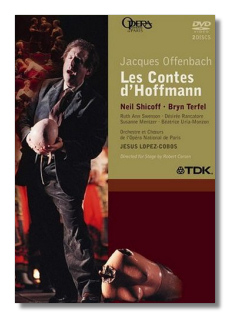
The Internet's Premier Classical Music Source
Related Links
- Offenbach Reviews
- Latest Reviews
- More Reviews
-
By Composer
-
Collections
DVD & Blu-ray
Books
Concert Reviews
Articles/Interviews
Software
Audio
Search Amazon
Recommended Links
Site News
 DVD Review
DVD Review
Jacques Offenbach

Les Contes d'Hoffmann
- Neil Shicoff (Hoffmann)
- Bryn Terfel (Lindorf/Coppélius/Dr. Miracle/Dapertutto)
- Susanne Mentzer (La Muse/Nicklausse)
- Désirée Rancatore (Olympia)
- Ruth Ann Swenson (Antonia)
- Béatrice Uria-Monzon (Giulietta)
- Michel Sénéchal (Andrès/Cochenille/Frantz/Pitichinaccio)
Orchestre et Choeurs de l'Opéra National de Paris/Jesús López-Cobos
TDK DVUS-OPLCDH 2DVDs 173min Anamorphic Widescreen Dolby Digital 5.1 DTS LPCM Stereo
If a citizen of some other country had done this to poor Hoffmann, no doubt the French would be screaming bloody murder. Instead, this wayward production, in which striving for effect tramples good sense in the dust, is loudly applauded by the audience at the Bastille, whose members clearly were out for spectacle and "something different."
Something different is what they got. This is a modern dress production. Luther's tavern has been converted into a smart, upscale bar, clearly frequented by the "beautiful people." I can live with that. I had a more difficult time, though, with Olympia having sex with Hoffmann in a hay cart during the second verse of her aria, coloratura display coinciding with her orgasm. The Antonia act (which comes next in this production) takes place not in Crespel's home, but in an empty orchestra pit – Dr. Miracle appears not to be a physician but a conductor. The Giulietta act seems to be taking place in the same auditorium, but this time among the "audience," whose members are coupling indiscriminately as the Barcarolle draws to a close. (The rows of seats slide back and forth in an approximation of waves.) What does it all mean? You've got me, and Jules Barbier's libretto can go hang, apparently. Director Robert Carsen has a few good ideas, but they get lost in an orgy of cleverness without heart. What is Hoffmann without the Romantic spirit?
Carsen asks Neil Shicoff to portray the poet as a middle-aged alcoholic. (Shicoff also bears a vague but unfortunate resemblance to George W. Bush.) Nothing could be less attractive; here is a Hoffmann who elicits little sympathy. Shicoff's voice is frayed, and even the character's intimate moments are delivered with a hectoring bray.
Can Hoffmann survive without a creditable performance of the title role? There are some mitigating factors here. In terms of acting, Bryn Terfel doesn't do much with his body, but he accomplishes a tour de force in his performance of the four nemesis roles. As a singer, he keeps getting better and better, and although his villainy is monochromatic, at least he looks the part. Ruth Ann Swenson sings a glorious Antonia, and Désirée Rancatore is an impressive Olympia, Carsen's boorish staging notwithstanding. Mention must also be made of Mentzer's solid Nicklausse and Muse – this edition of Offenbach's score gives her more to sing than usual - and of veteran Michel Sénéchal in the character tenor roles. Lopez-Cobos conducts with a good feeling for the score, but synchrony between the pit and the stage is sometimes off.
Offenbach died before he could complete a definitive version of this score. For many years we had a very serviceable edition from Ernest Guiraud, but in the 1980's and 90s, musicologists (possibly emboldened by the success of the original instruments movement in Baroque music) made new efforts to guess what it was that Offenbach had in mind. The present version retains "inauthentic" arias such as Dapertutto's "Scintille, diamant," and adds bulk to the Prologue and Epilogue. (Unfortunately, Hoffmann loses the second verse of his drinking song in the Giulietta act, though.) The result is a long evening in the Bastille. If the Hoffmann were better and the production less contrary, I wouldn't mind, but nearly three hours (without bonus material) is an awfully long time to spend on this performance. The picture format is 16:9, and the sound options are Dolby Digital 5.1, DTS 5.1, and LPCM Stereo – no complaints here, at least. The subtitling is well done. This production was recorded "live" on October 4 and 9, 2002.
In short, this is not what I was hoping for. Hoffmann, where are you?
Copyright © 2004, Raymond Tuttle


















